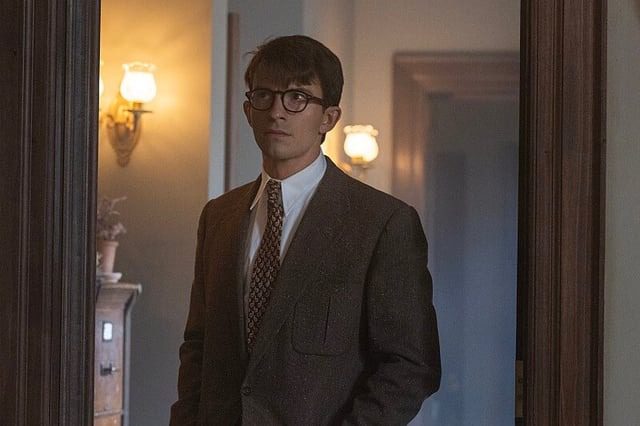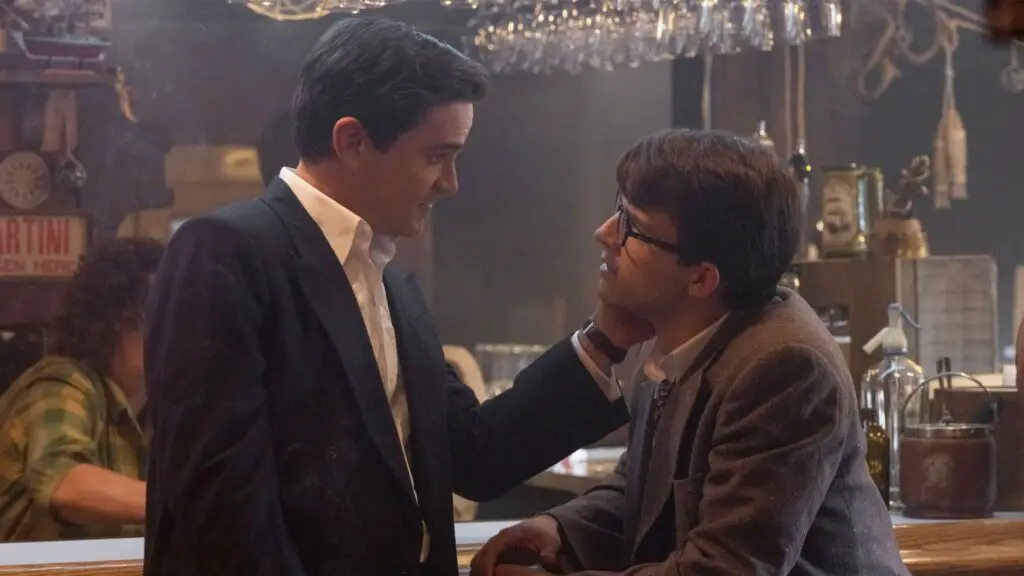Episode 3 of “Fellow Travelers,” the historical romance and political thriller miniseries on Showtime, delves deeper into the complex relationship between Hawkins Fuller (played by Matt Bomer) and Timothy Laughlin (Jonathan Bailey) against the backdrop of America’s turbulent political landscape. This episode intricately portrays the challenges and emotional turmoil faced by the couple as they navigate their way through the 1950s, an era marked by McCarthyism, and into the tumultuous decades that follow.
The episode opens with a tense scene between Marcus and Frankie, highlighting the personal and societal struggles that come with being a gay man in this era. Marcus is seen admonishing Frankie to be discreet to avoid arrest, a stark reminder of the times’ oppressive nature towards the LGBTQ+ community. This scene sets the tone for the episode, illustrating the constant fear and caution that characters like Marcus and Frankie must live with.
The narrative then shifts to a raw and intense moment between Hawk and Tim, where their relationship’s physical and emotional complexity is exposed. Their encounter is charged with a mix of passion, aggression, and vulnerability, revealing the depth and intensity of their bond. This scene is pivotal in understanding the dynamics of their relationship, as it encapsulates their love’s passionate and tumultuous nature.
The Haunting Shadows of the Past
As the episode progresses, the focus shifts to the characters’ personal histories and the broader societal context they exist within. Marcus’s reflections on his experiences as a Black man in post-war America are particularly poignant. His narrative about the lies of desegregation and his struggle with his identity offer a glimpse into the racial tensions and civil rights issues of the time. This subplot adds depth to the show, highlighting the intersection of race and sexuality in the characters’ lives.
The political backdrop of the series is further developed through the subplot involving Roy Cohn and his investigation into communist ties within the military. This storyline provides context to the overarching theme of McCarthyism that looms large over the characters and their actions. The historical accuracy and detail in this subplot add a layer of realism to the series, grounding it in the specific political and social realities of the time.
The Emotional and Political Interplay

In one of the episode’s most poignant moments, Hawk and Tim confront the necessity of lying as a survival tool in a society that doesn’t accept them. This conversation between the two on the beach is a heart-wrenching exploration of the compromises and sacrifices they must make to live in a world that is hostile to their love. This scene poignantly captures the emotional and political struggles they face, making it a standout moment in the episode.
The episode also touches upon the evolving societal attitudes towards the LGBTQ+ community, as seen in Hawk’s experience at the hospital. His candid conversation about his sexual history is a subtle yet powerful reminder of the changing times and the gradual shift in societal norms and perceptions.
Critical Perspective
While the episode has its high points, particularly in the portrayal of Hawk and Tim’s relationship, it also faces criticism for its pacing and narrative focus. The intertwining of multiple storylines, including the McCarthy hearings and other characters’ individual stories, at times overshadows the central romance. This has led to some viewers feeling that the series could benefit from a tighter narrative focus, honing in more on the core relationship between Hawk and Tim and less on the broader political context.
In conclusion, Episode 3 of “Fellow Travelers” is a compelling mix of personal drama, historical context, and political intrigue. While it excels in portraying the deep and complex relationship between its main characters, it also juggles multiple themes and storylines that can occasionally feel overwhelming. Nonetheless, the episode offers a rich and nuanced exploration of love, identity, and politics in a time of great change and turmoil.


